Life of Nasreddin Hoca
NASREDDİN HOCA (1208-1284)
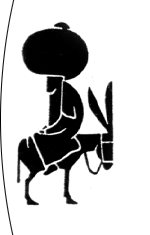 A popular scholar, He was famously considered the foremost protagonist of comical tales with an emotional content or other message.
A popular scholar, He was famously considered the foremost protagonist of comical tales with an emotional content or other message.
He was born in the district of Hortu, in Sivrihisar, and died in Akşehir. His father was the village imam in Hortu, Abdullah Efendi, and his mother Sıdıka from the same village. He was first educated at the religious school in Sivrihisar, and on his father’s death returned to Hortu to take up the post of imam. In 1237, he moved to Akşehir, and attended lessons given by Seyyid Mahmud Hayrani and Seyyid Haci Ibrahim, continuing his study of Islam. According to one account, he gave lessons in the school, and served as a judge. That is how he came to be given the name Nasuriddin Hace, which then turned into the more familiar Nasreddin Hoca. Definite facts about his life have become mixed up with fictitious anecdotes because of the peoples’ great affection for him, and he has even been ascribed extraordinary powers. Among these claims is one that he met the Seljuk sultans, was close to Mevlana Celaleddin, spoke to Tamburlaine who lived at least 70 years after him, and was even seen in several places at the same time.
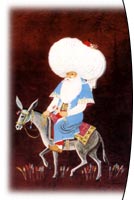 Nasreddin Hoca’s importance lies not in the incidents recounted themselves, but in the meaning behind his amusing words, either his own or those popularly quoted, and their satirical or amusing elements. Study of the words that are believed to be his shows that, he expressed the lifestyle, sense of humour and slightly satirical manner of the people of Anatolia, and that his words are not to be seen as confined to one particular period or time. The anecdotes about him focus particularly on love, satire, praise and gentle mockery. He preferred to oppose the stricter elements of Islamic law with laughter, even self-mockery, and a desire to avoid using harsh words. His words are a contradictory combination of the wise, ignorant, cunning, harmonious, insensitive, bashful, surprised, timorous and dashing.
Nasreddin Hoca’s importance lies not in the incidents recounted themselves, but in the meaning behind his amusing words, either his own or those popularly quoted, and their satirical or amusing elements. Study of the words that are believed to be his shows that, he expressed the lifestyle, sense of humour and slightly satirical manner of the people of Anatolia, and that his words are not to be seen as confined to one particular period or time. The anecdotes about him focus particularly on love, satire, praise and gentle mockery. He preferred to oppose the stricter elements of Islamic law with laughter, even self-mockery, and a desire to avoid using harsh words. His words are a contradictory combination of the wise, ignorant, cunning, harmonious, insensitive, bashful, surprised, timorous and dashing.
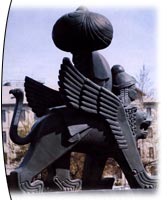 One particular feature of anecdotes concerning him is his delight in perplexing others. These reflect the attitude of the people of Anatolia to particular situations, and are actually the products of their thoughts. Nasreddin Hoca therefore emerges as a focus of humorous stories that reflect the feelings of the people. The true voices of the speakers appear, and Nasreddin Hoca appears before us with his own.
One particular feature of anecdotes concerning him is his delight in perplexing others. These reflect the attitude of the people of Anatolia to particular situations, and are actually the products of their thoughts. Nasreddin Hoca therefore emerges as a focus of humorous stories that reflect the feelings of the people. The true voices of the speakers appear, and Nasreddin Hoca appears before us with his own.
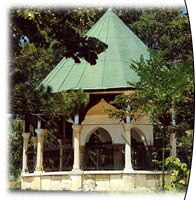
In all his humorous stories, Nasreddin Hoca emerges not as a concrete being, but rather as a link between a links to an event. Approval or disapproval of an incident is expressed in a humorous manner. The incidents he witnessed tend to take place among the people. He seldom or never has anything to do with the aristocracy or palace circles. There are no humorous tales regarding his alleged meetings with the Seljuk sultans. The one about Tamburlaine is a much later product, since he lived at a much later time. The idea of him appearing before such a great man, who spread terror everywhere, in the baths, is merely a form of satire of those in their palaces who see themselves as superior to the ordinary people.
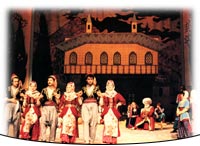 Another important element in Nasreddin Hoca stories is the donkey, a reflection of the feelings of the people. It is impossible to imagine Nasreddin Hoca without his donkey, which is itself a vehicle of satire. The horse has pretty much no place in those humorous tales invented by the people of Anatolia. The donkey, with its suffering and pain, the blows that are inflicted on it, is the most widespread symbol. No donkeys are to be found in humorous tales from the palaces. Such people ride on horses. Another contradiction is to be seen in this context, the humorous and the more mocking element of such tales. One instance of this appears in the story of the villager who asks to borrow nasreddin Hoca’s donkey. He says the donkey is not at home, only to be interrupted by the donkey braying from the stable. When the villages say that the donkey must be in the stable, Nasreddin Hoca demands to know whether the villager prefers to believe him or a donkey.
Another important element in Nasreddin Hoca stories is the donkey, a reflection of the feelings of the people. It is impossible to imagine Nasreddin Hoca without his donkey, which is itself a vehicle of satire. The horse has pretty much no place in those humorous tales invented by the people of Anatolia. The donkey, with its suffering and pain, the blows that are inflicted on it, is the most widespread symbol. No donkeys are to be found in humorous tales from the palaces. Such people ride on horses. Another contradiction is to be seen in this context, the humorous and the more mocking element of such tales. One instance of this appears in the story of the villager who asks to borrow nasreddin Hoca’s donkey. He says the donkey is not at home, only to be interrupted by the donkey braying from the stable. When the villages say that the donkey must be in the stable, Nasreddin Hoca demands to know whether the villager prefers to believe him or a donkey.
Beliefs about the hereafter also have an important place in these tales, some of which, such as ‘I always came this way when I was healthy,’ are explicatory of feelings in the face of strict religious dogma.
Nasreddin Hoca’s influence spread to all sections of society. He also led to the birth of other humorous tales reflecting the mindsets of very different areas. One such, ‘Bektashi,’ reflects the popular distaste for strict shariah law.